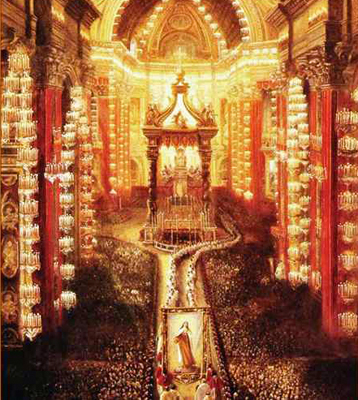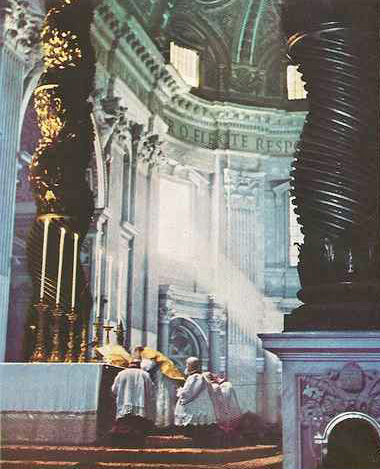

Canonization of St. Therese the Little Flower by Pope Pius XI.
It is Jesus Christ Himself Who is the source as well as the object of the Liturgy; and hence the ecclesiastical year is neither more nor less than the manifestation of Jesus Christ and His Mysteries, in the Church and in the faithful soul. It is the divine cycle, in which appear all the works of God, each in its turn: the seven days of the Creation; the Passover and Pentecost of the Jewish people; the ineffable visit of the Incarnate Word; His Sacrifice and His victory; the Descent of the Holy Ghost; the Holy Eucharist; the surpassing glories of the Mother of God, Ever-Virgin; the magnificence of the Angels; the merits and triumphs of the Saints. Thus the cycle of the Church may be said to have its beginning under the patriarchal Law, its progress under the written Law, and its completion under the Law of love, in which, at length, having attained its last perfection, it will disappear in eternity, as the written Law gave way the day on which the invincible power of the Blood of the Lamb rent asunder the veil of the temple.
Would that we might worthily describe the sacred wonders of this mystical calendar, of which all others are but images and humble auxiliaries! Happy indeed should we deem ourselves, if we could make the faithful understand the grand glory which is given to the Blessed Trinity, to Our Savior, to the Blessed Virgin Mary, to the Angels and Saints, by this annual commemoration of the works of our God! If, every year, the Church renews Her youth as that of the eagle (Ps. 102: 5), She does so because, by means of the cycle of the Liturgy, She is visited by Her Divine Spouse, Who supplies all Her wants. Each year She again sees Him an Infant in the manger, fasting in the desert, offering Himself on the Cross, rising from the tomb, founding His Church, instituting the Sacraments, ascending to the right hand of the Father, and sending the Holy Ghost upon men. The graces of all these divine mysteries are renewed in Her; so that, being made fruitful in every good thing, the mystic garden yields to Her Spouse, in every season, under the influence of the Spirit He breathes into Her, the sweet perfume of aromatic spices (Cant. 4: 16). Each year the Spirit of God retakes possession of His well-beloved and gives Her light and love; each year She derives an increase of life from the maternal influence which the Blessed Virgin exercises over Her, on the feasts of Her joys, Her dolors, and Her glories; and lastly, the brilliant constellation formed by the successive appearance of the Nine Choirs of the Angels, and of the Saints in their varied orders of Apostles, Martyrs, Confessors, and Virgins, sheds on Her, each year, powerful help and abundant consolation.
Now, what the Liturgical Year does for the Church in general, it does also for the soul of each one of the faithful that is careful to receive the gifts of God. his succession of mystic seasons imparts to the Christian the elements of that supernatural life, without which every other life is but a sort of death, more or less disguised. Indeed, there are some souls, so far acted upon by the divine succession of the Catholic cycle, that they experience even a physical effect from each season: the supernatural life has gained ascendancy over the natural, and the calendar of the Church makes them forget that of astronomers.
Let the Catholic who reads these pages be on his guard against that coldness of faith, and that want of love, which have well-nigh turned into an object of indifference that admirable cycle of the Church, which heretofore was, and always ought to be, the joy of the people, the source of light to the learned, and the book of the humblest of the faithful.

Pope Pius XII offering Holy Mass at St. Peter's Basilica.
The year planned out for us by the Church Herself produces a drama the sublimest that has ever been offered to the admiration of man. God intervening for the salvation and sanctification of men; the reconciliation of Justice with Mercy; the humiliations, the sufferings, and the glories of the God-Man; the coming of the Holy Ghost, and His workings in humanity and in the faithful soul; the mission and the action of the Church—all are there portrayed in the most telling and impressive way. Each mystery has its time and place by means of the sublime succession of the respective anniversaries. A divine fact happened two thousand years ago; its anniversary is kept in the Liturgy, and its impression is thus reiterated every year in the minds of the faithful, with a freshness, as though God were then doing for the first time what He did so many ages past. Human ingenuity could never have devised a system of such power as this. For what is the Liturgy, but an untiring affirmation of the works of God—a solemn acknowledgment of those divine facts, which, though done but once, are imperishable in man's remembrance, and are every year renewed by the commemoration he makes of them? Have we not our writings of the apostolic age, our acts of the Martyrs, our decrees of ancient Councils, our writings of the Fathers, our monuments, taking us to the very origin of Christianity, and testifying to the most explicit tradition regarding our feasts?
But though the Liturgy so deeply impresses us by annually bringing before us the dramatic solemnization of those mysteries which have been accomplished for the salvation of man and for his union with his God, it is nevertheless wonderful how the succession of year after year diminishes not one atom of the freshness and vehemence of those impressions with the spirit of a sweet and mysterious expectation. Christmas ever charms us with the incomparable joy of the birth of the Divine Child. We enter, with the well-known feeling, into the gloom of Septuagesima. Lent comes, and we prostrate ourselves before God's justice, and our heart is felled with a salutary fear and compunction, which seem so much keener than they were the year before. The Passion of our Redeemer, followed in every minutest detail, does it not seem as though we never knew it till this year? The pageant of Easter makes us so glad, that our former Easters appear to have been only half kept. The triumphant Ascension discloses to us, upon the whole economy of the Incarnation, secrets which we never knew before this year. When the Holy Ghost comes down at Pentecost, is it not the case that we so thrill with the renewal of the great Presence that our emotions of last Pentecost seem too tame for this? However habituated we get to the ineffable gift which Jesus made us on the eve of His Passion, the bright dear Feast of Corpus Christi brings a strange increase of love to our heart; and the Blessed Sacrament seems more our own than ever. The Feasts of our Blessed Lady come round, each time revealing something more of Her greatness; and the Saints—with whom we fancied we had become so thoroughly acquainted—each year as they visit us seem so much grander, we understand them better, we feel more sensibly the link there is between them and ourselves.
This renovative power of the Liturgical Year is a mystery of the Holy Ghost, Who unceasingly animates the work which He has inspired the Church to establish among men; that thus they might sanctify that time which has been given to them for the worship of their Creator. The renovation works also a twofold growth in the minds of man: the increase of knowledge of the truths of Faith, and the development of the supernatural life. There is not a single point of Christian doctrine which, in the course of the Liturgical Year, is not brought forward—nay, is not inculcated with that authority and unction wherewith our Holy Mother the Church has so deeply impregnated Her words and Her eloquent rites. The faith of the believer is thus enlightened more and more each year; the theological sense is formed in him; prayer leads him to knowledge. Mysteries continue to be mysteries; but their brightness becomes so vivid, that the mind and heart are enchanted, and we begin to imagine what a joy the eternal sight of these divine beauties will produce in us, when the glimpse of them through the clouds is such a charm to us.
Yes, there must needs be a great progress in a Christian soul, when the object of her faith is ever gaining greater light; when the hope of her salvation is almost forced upon her by the sight of all those wonders which God's goodness has wrought for His creatures; and when charity is enkindled within her under the breath of the Holy Ghost, Who has made the Liturgy to be the center of His working in men's souls. Is not the formation of Christ within us (Gal. 4: 19) the result of our uniting in His various Mysteries, the Joyful, the Sorrowful, and the Glorious? These Mysteries of Jesus come into us, are incorporated into us each year, by the power of the special graces which the Liturgy produces by communicating them to us: the new man gradually grows up, even on the ruins of the old. Then again, in order that the divine type may the more easily be stamped upon us, we need examples; we want to see how our fellow-men have realized that type in themselves: and the Liturgy fulfills this need for us, by offering us the practical teaching and the encouragement of our dear Saints, who shine like stars in the firmament of the ecclesiastical year. By looking upon them we come to learn the way which leads to Jesus, just as Jesus is our Way which leads to the Father. But above all the Saints, and brighter than them all, we have Mary, showing us, in Her single person, the Mirror of Justice, in which is reflected all the sanctity possible in a pure creature.
Contact us: smr@salvemariaregina.info
Visit also: www.marienfried.com